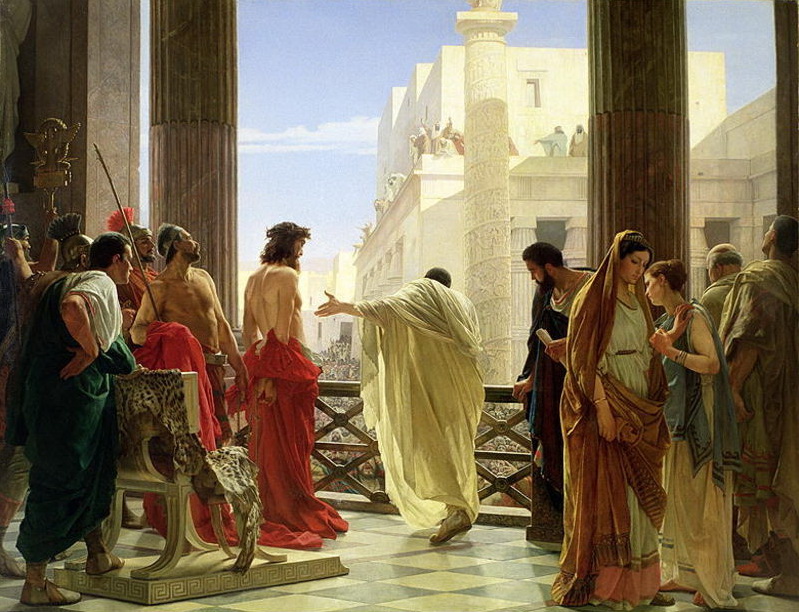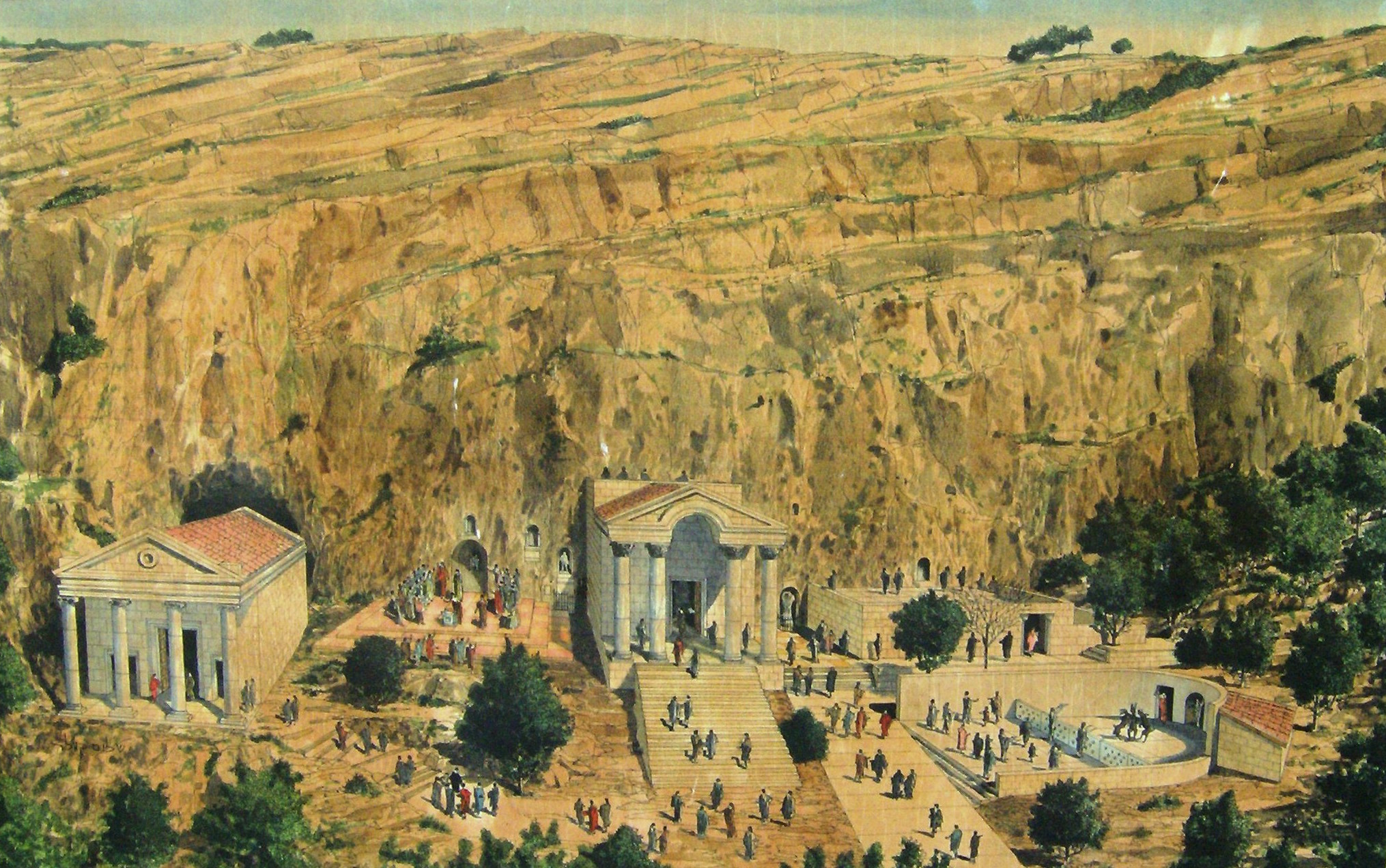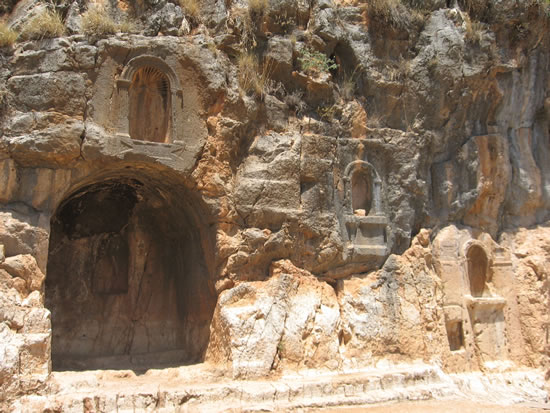 Matthew 21:1-11
Matthew 21:1-11
Isaiah 50:4-7
Psalm 22:8-24
Philippians 2:6-11
Matthew 26:14-27:66
 Matthew 21:1-11
Matthew 21:1-11
Isaiah 50:4-7
Psalm 22:8-24
Philippians 2:6-11
Matthew 26:14-27:66
As children we waved our palms and shouted "Hosanna!" imagining as He rode into Jerusalem: "Hosanna in the highest!" It was grand and a chance to be unquiet in church. Then suddenly and inexplicably we were thrust into sadness, and everyone who had been cheering a moment ago now hated this Man. And members of the choir cried out, "Crucify Him!" as parishioners followed their scripts. How could our procession of palms and triumphant music so quickly descend to the grieving quiet of "O Sacred Head Now Wounded"?
I wonder how many mixed feelings and confused impressions remain with us still. And this is right. Palm Sunday should remain for us a painfully conflicted day, for that is what happened. This is the essence of mob mentality: to cheer in the morning, cry "Crucify!" in the afternoon, and at all times to know not what we do. What can compare to this great swirl of dust and blood and wrenching confusion? And all the chaos and conflict and contradiction flowed like a volcanic spring out of one question: "Who do you say that He is?" Everything that He has been — His ministry, His miracles, His divine presence — all proceed from this question, posed forcefully to everyone who saw Him, or even knew Him, .... and is still posed to us today: "Who do you say that He is?"
He was not a Prophet nor a King nor the One Who is Coming into the World, but all of these and far more than any of these. He claims only to be the Son of Man, which is to say, any human, a Son of Adam, and to be the Son of God, which is to say, holy. Yes, the Son and the Heir is sent to the Vineyard, where He is to be murdered, but mysteriously the unruly people set not upon a man, but rather find themselves in a deathlock with God. The Messiah, the Christ, the Holy One, the One Who is Coming into the world turns out to be not an ambassador or a legate, but the great Emperor Himself, the King of the Universe, inscrutably disguised to be a Man, fully a Man. And nothing again will ever be the same.
As a boy I had imagined lowly Jesus riding into Jerusalem on a donkey seeking acceptance and approval. After all, was I not told Sunday after Sunday that He was meek and wanted to give us His love? My young mind could not grasp that He was God and all that this could mean. He was not a quiet, little man hoping that everyone might love Him. Far from it! Palm Sunday was what the Prophets called, the Day of the Lord: when God comes into the midst of His people, not to receive their judgment, but to render His. What a reversal of expectations was here! And yet all things are possible for God, for He contains with Himself the prismatic fullness of all that He has made.
For so many foggy questions in my cluttered mind, the mist lifted when I visited the Holy Land. Please sail with me to that holy place we call Terra Sancta, where God entered the human lifeworld, ministered to us, was murdered, and then returned to Heaven. The year is 32 A.D. With a strong west wind astern, we plow the blue waters of the Mediterranean. Italy and Greece are well behind us. Off the port bow lays Ilium and the ruins of Troy. Dead ahead is Caesarea Maritima, Palestine's great harbor and one of the engineering wonders of the ancient world. You can see it for miles out to sea, for there gleaming in the morning light is the enormous Temple of Roma and of Augustus, completed only forty-two years ago. The Arab king Herod the Great constructed this great harbor and temple to project Rome's imperial power to all those who sailed the Eastern Mediterranean, in effect, to set Caesar Augustus' standard on the border of Asia announcing the imperial name to the world, the one they called the God-King. Once we disembark, we find ourselves in a marvelous city, one of the world's most imposing ports. With its magnificent buildings echoing the glory of ancient Greece and of Rome, it was constructed to provide the Roman Empire with a more suitable and hospitable place than the overcrowded, stinking, and dangerous city of Jerusalem.
Now let us fly inward to the Holy Land's interior. Ahead of us are the the Decapolis, the Ten Cities, with their enormous, white-columned buildings, their colonnaded market places, and pagan temples. We find even a Colosseum-style building where large-scale spectacles were held such as chariot races and athletic contests. Do not be fooled by biblical passages that depict the Disciples as country bumpkins staring in wonder at the tall buildings of Jerusalem. Their world was filled with imposing structures. They grew up in the midst the architecture of imperial and kingly power. Indeed, only four years ago, Herod the Great's son attempted to install Rome's eagle standards on the Temple on Mt. Zion itself, leading to general insurrection and rioting.
 Now let us head north to another display of power,
to the holy ground
that is the headwaters of the Jordan.
For the pagans this was among the most holy of places,
Banias
—
the locale of
the Temple of Augustus, the Temple of Pan, and the great Grotto of Pan,
a kind of holy of holies, where sacrifices were placed.
To our left is the great Temple of Augustus,
soaring more than 50' into the air whose portico was upheld by four columns, eight feet in diameter.
To its right stood the Temple of Pan, more massive than its neighbor and built
into the side of a mountain and cave entrance as all Pan worship had to be a natural setting.
On the back wall of Pan's temple, carved into the side of the mountain,
were booths where statues of Pan and other gods stood.
The power of this place was palpable as one beheld these large temples and the towering mountain directly behind them.
Directly in our foreground and in front of these structures was another holy site:
the headwater-springs of the Jordan River, which is the life's blood of all the Holy Land.
Together, these places were known in the first century as Caesarea-Panaeus,
built in the third century B.C. during the conquests of Alexander the Great,
which hellenized the Holy Land
(and much of the rest of the world)
for 1,000 years.
The name of this holy city during Jesus' time was
Caesarea-Philippi.
Now let us head north to another display of power,
to the holy ground
that is the headwaters of the Jordan.
For the pagans this was among the most holy of places,
Banias
—
the locale of
the Temple of Augustus, the Temple of Pan, and the great Grotto of Pan,
a kind of holy of holies, where sacrifices were placed.
To our left is the great Temple of Augustus,
soaring more than 50' into the air whose portico was upheld by four columns, eight feet in diameter.
To its right stood the Temple of Pan, more massive than its neighbor and built
into the side of a mountain and cave entrance as all Pan worship had to be a natural setting.
On the back wall of Pan's temple, carved into the side of the mountain,
were booths where statues of Pan and other gods stood.
The power of this place was palpable as one beheld these large temples and the towering mountain directly behind them.
Directly in our foreground and in front of these structures was another holy site:
the headwater-springs of the Jordan River, which is the life's blood of all the Holy Land.
Together, these places were known in the first century as Caesarea-Panaeus,
built in the third century B.C. during the conquests of Alexander the Great,
which hellenized the Holy Land
(and much of the rest of the world)
for 1,000 years.
The name of this holy city during Jesus' time was
Caesarea-Philippi.
Today, as it happens, Jesus is seated near the headwater springs giving his disciples a place of respite and refreshment. The place is cool and misty, and one is able to reflect quietly midst the peaceful sound of bubbling springs. As they recline before Him on the ground, they see Him and behind Him the towering mountain, the white temples, and the world-famous Grotto. And there He confronts them and speaks directly of Himself as He never has before: "Who do you say that I am?" No doubt, the ones who tell him that people say He is a great prophet believe they are flattering Him. Yet, the choices of "god," "king," or "emperor" lie directly before them.
 Behind the temples and
forming the back wall of the Temple of Pan
is Mount Hermon.
Six days later, Jesus will take three of them to its high summit,
far above the pagan gods,
a kind of Heavenly Olympus,
but above Olympus,
and
He will reveal His identity
to them before the presence of the Law (which is Moses) and the Prophets (which is Elijah) and before Father God Himself,
Who will attest to the divinity of this Man they have called "Jesus."
Peter, filled with dread and remembering the Temple of Pan,
where he had seen five booths for pagan gods, says,
"Lord, it is well that we are here; if you wish, I will make three booths here, one for you and one for Moses and one for Eli'jah" (Mt 17:4).
Peter seeking ever to please,
he is trembling and grasping desperately to understand.
They fell on their faces,
we read.
They were filled with awe.
They were stupefied before this unimaginable burst of spiritual power and light.
Questions swirl like a dust storm.
What is this puzzle He has set before us?
Is He a god like Pan?
Are the Hebrew prophets gods?
Where is this place?
Where am I??
Who am I?
And Who is He?
A prophet?
Certainly, not!
A king?
O, far above a king!
A god?
No, above the gods.
Is He the Son of God?
Well, that phrase had been used for thousands of years to refer merely to holy men or to angels.
No.
He is far above the angels and certainly above holy men.
Behind the temples and
forming the back wall of the Temple of Pan
is Mount Hermon.
Six days later, Jesus will take three of them to its high summit,
far above the pagan gods,
a kind of Heavenly Olympus,
but above Olympus,
and
He will reveal His identity
to them before the presence of the Law (which is Moses) and the Prophets (which is Elijah) and before Father God Himself,
Who will attest to the divinity of this Man they have called "Jesus."
Peter, filled with dread and remembering the Temple of Pan,
where he had seen five booths for pagan gods, says,
"Lord, it is well that we are here; if you wish, I will make three booths here, one for you and one for Moses and one for Eli'jah" (Mt 17:4).
Peter seeking ever to please,
he is trembling and grasping desperately to understand.
They fell on their faces,
we read.
They were filled with awe.
They were stupefied before this unimaginable burst of spiritual power and light.
Questions swirl like a dust storm.
What is this puzzle He has set before us?
Is He a god like Pan?
Are the Hebrew prophets gods?
Where is this place?
Where am I??
Who am I?
And Who is He?
A prophet?
Certainly, not!
A king?
O, far above a king!
A god?
No, above the gods.
Is He the Son of God?
Well, that phrase had been used for thousands of years to refer merely to holy men or to angels.
No.
He is far above the angels and certainly above holy men.
To understand who He is, they must think back, far back into salvation history — to the God who parted the Red Sea (did He not master the sea and the winds?); to the God Who led His people into the wilderness for holy intimacy (did He not bring us to desert places and commune with our souls?); to the God Whose arrival is heralded by blind eyes being opened, deaf ears unstopped, the lame leaping like harts (did He not do all this and raise the dead besides?). Over and over and over again, He reveals His identity to them: not the Son of God as they understand this phrase, but God. Indeed, He has revealed His true identity on the summit of Mount Hermon and has told them directly, "I and the Father are One" (Jn 10:30). Yet, they still do not understand Who He is.
Then He decides to enact one, final drama that surely they will recognize. Taking them and thousands more into a desert place, He sets the scene dearest to God's heart — God far from the cities and alone in the wilderness with His people who are completely dependent upon Him. And there He feeds the multitudes with bread that comes virtually out of nowhere. Yet still they fail to recognize Him:
|
"Do you not yet perceive or understand? Are your hearts hardened? Having eyes do you not see,
and having ears do you not hear? And do you not remember? When I broke the five loaves for the five thousand, how many baskets full of broken pieces did you take up?" They said to him, "Twelve." "And the seven for the four thousand, how many baskets full of broken pieces did you take up?" And they said to him, "Seven." And he said to them, "Do you not yet understand?" (Mk 8:17-21) |